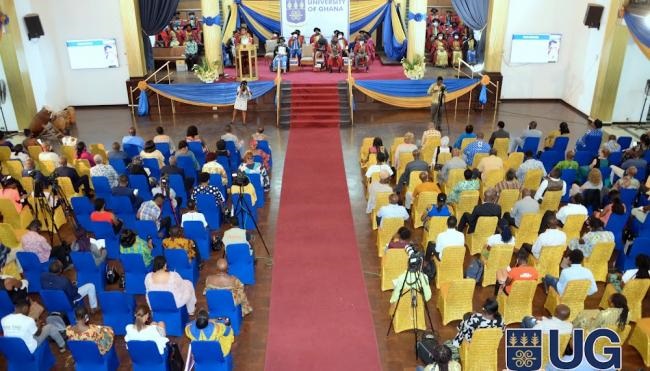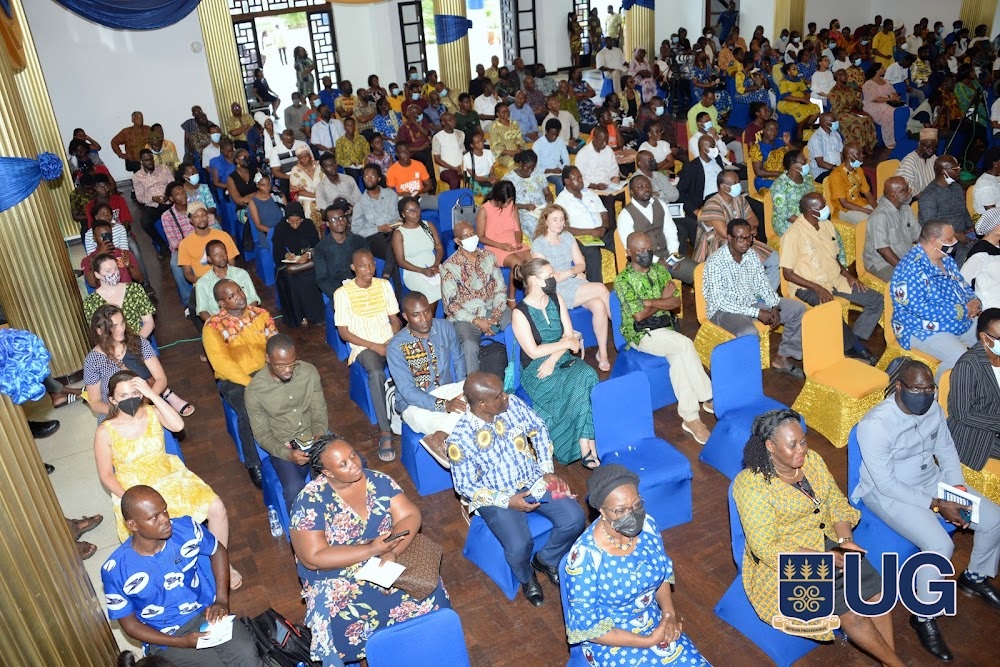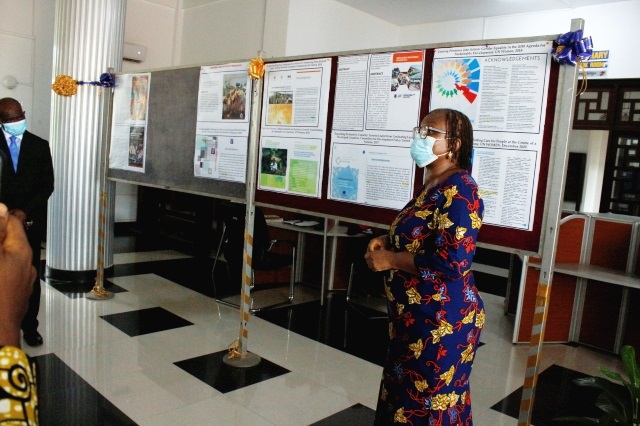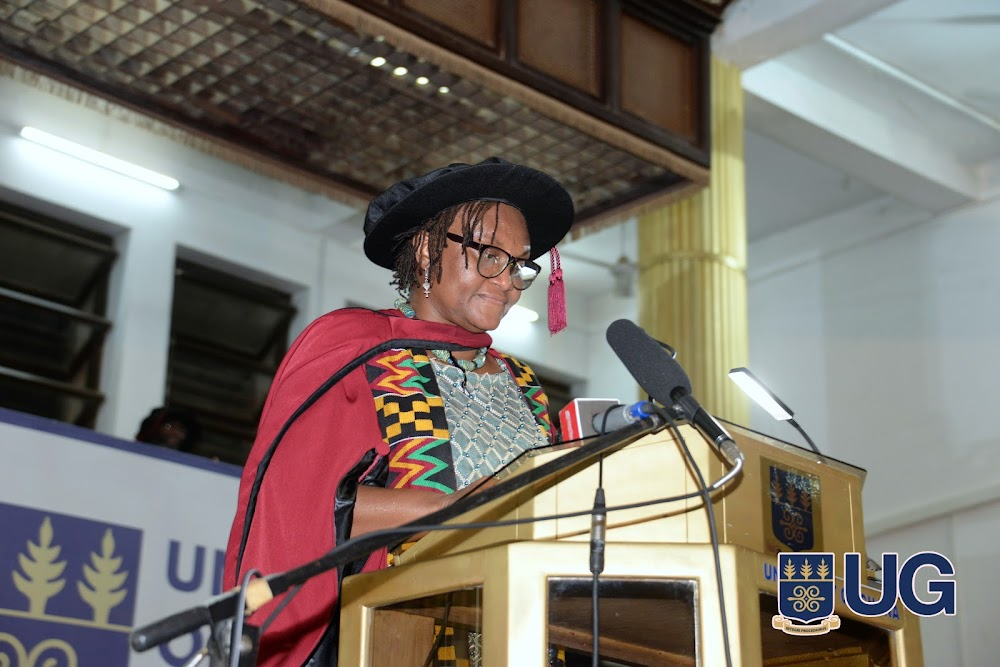Prof. Dzodzi Akuyo Tsikata, Professor of Development Sociology and Director, Institute of African Studies (IAS), has posed a question on how the state in Ghana is experienced by citizens, and how its acts of commission and omission affect class, gender and spatial differences in Ghana. She made these remarks at her inaugural lecture on the topic: “The Road Has Many Stories: Encounters between the State and Citizens of the Different Ghanas”.
Giving the literal and metaphorical juxtaposition to “the Road” in her topic, Prof. Tsikata noted that “the Road” is a metaphor for the social contract between the state and citizens in Ghana. Prof. Akuyo Tsikata commenced the lecture by expressing the importance of the topic to the current global and national conjuncture. “This topic is important not only because it has animated my intellectual endeavours in the last three decades; it also concerns the current global and national conjuncture, where the experiences of the Covid-19 pandemic have generated a lively commentary about the state society relations”, she explained. She added that the great suffering that accompanied lockdowns, border closures and other containment measures exposed the fact that the economic and social systems of neo-liberal globalisation were not designed to deal with unexpected crises. She urged Ghana as a country to look at these issues as well as the elevated levels of insecurity, civil strife, coup d’etats and national disintegration in the West Africa region and have a cause to pause, reflect and take preventive and remedial action.
Prof. Akuyo Tsikata, stated the directive principles of State Policy of the 1992 Constitution, particularly section 36(2) and what constitutes sections 35-39, and bemoaned how the Ghanaian state, its agencies and agents increasingly spend more time worrying about political party manifesto promises than working with citizens to fulfill these provisions in the constitution. “As a result, experiences of citizenship are structured by whether you live in Northern or Southern Ghana; rural or urban Ghana; in a rich or poor region; whether your home is in a residential area or in an unplanned settlement; whether you work in agrarian Ghana, the urban informal or the urban formal Ghana; whether you have an employer or not; whether your workplace is an office, open-air market, roadside or a home. Even within the same spaces, citizens may be living in different Ghanas”, she added.

Prof. Dzodzi Akuyo Tsikata delivering her inaugural lecture
Prof. Akuyo Tsikata referred to the Marxist and neo-marxist approach; developmental state approach; patrimonialism/clientelism; the political settlement approach and the patriarchal approach as five approaches that speak to her lecture and recognised some of the ways through which the state, its institutions and officials relate to citizens. She noted that citizens can be differentiated by how they experience the state in the performance of its functions and the quality of these experiences. Prof. Tsikata further mentioned the positive diversity in Ghana which is an innovative response to the lack of resources in certain regions. Citing an example to this remark, she stated that it is when diversity becomes disadvantageous and shows inequality that there is a cause for concern. “It is unacceptable that in a lower-middle-income country in the 21st century, large swathes of our population live from hand to mouth, while in enclaves in Accra, Kumasi, Takoradi and Tamale, clubs of dollar millionaires live in another Ghana’’, she stated
She noted that inequalities in Ghana have been documented by researchers over the years, by successive Ghana Living Standards Surveys (GLSS) since 1991, and by the recent National Population Census 2021. Giving some statistics on how Ghana became a middle-income country in 2013, she noted that the consistent economic growth that made it possible is marred by the fact that inequality has been rising steadily in Ghana since 1990, and now stands at 43.5 percent. “Compared with other lower-middle-income countries, and our neighbours, Ghana is not doing well in terms of inequalities. Out of a group of eleven lower-middle-income African countries, Ghana has the fourth highest level of inequality, and is the worst in West Africa. While inequalities are dropping in most of the eleven countries, Ghana is one of the four countries where the level of inequality is rising’’, she stated.
Highlighting some inequalities in some parts of the country and on some groups of people, Prof. Tsikata indicated that Ghanaians may appear to have a high tolerance for inequality even though there are signs of efforts in our society to redistribute wealth. Noting that the tolerance for the inequality can be inferred from the most often used proverb, “All hands are not the same”, she expressed how the Ghanaian cultures inculcate in children the importance of avoiding the jealousy of rich people. She added that with efforts to redistribute wealth, our kinship system and practices of political and social patronage embody the expectation that those who are more fortunate will support the less fortunate in return for social capital and political power.
Prof. Akuyo Tsikata stated that societal concern about inequalities notwithstanding, research and policy to tackle inequalities have been hampered by several factors such as the dominance policy focus on poverty reduction, which has been in existence for decades now. She expressed how income approach to poverty fails to account for other relevant inequalities such as the non-income terms and conditions of work, the amount of time a person spends doing unpaid domestic work, and differences in access to and control of productive and reproductive resources. “Some influential economists are also more interested in inequalities of opportunity than in inequalities in outcome”, she added.

A cross-section of participants at the lecture
Indicating that these situations threaten national cohesion, peace, security and needs an urgent change of course that promotes positive and meaningful relations between the state and diverse groups of citizens – especially the working class, women and young people, she expressed hope in hero observation contributing to recent studies that have drawn attention to growing inequalities in Ghana and citizens’ increasing mistrust in the Ghanaian state.
Prof. Tsikata concluded her lecture with a focus on the importance of re-legitimising state responsibility for public goods and services, demanding the resolution of the land and labour questions of Agrarian Ghana, addressing the fundamental causes of conflict and reducing state violence, as well as transforming patriarchal rule and misogyny.
In her closing remarks, the Vice-Chancellor, Prof. Nana Aba Appiah Amfo, who chaired the lecture, congratulated Prof. Akuyo Tsikata for such a stimulating lecture. She was thankful to Prof. Tsikata for challenging all those present to contribute their quota to help address the issue of inequalities in the country. “We all can make a difference in our little corners as we keep challenging the state to do a lot more”, she stated. Prof. Amfo noted that the lecture is a call out to what the state can do to address inequalities. She added that the state has the capacity and resources to address it.
Earlier, in her opening remarks, the Registrar, Mrs. Emelia Agyei-Mensah, welcomed the audience and said, “inaugural lectures form an essential component of a university’s programme for an academic year and every academic who rises to the rank of a full Professor in his or her career in the University of Ghana is expected to deliver an inaugural lecture”. Mrs. Emelia Agyei-Mensah also stated that inaugural lectures offered the University an opportunity to showcase and celebrate the achievements of faculty as they share their research with colleagues within and outside the University.
A number of presentations were made by friends, family and members of the University community to celebrate Prof. Akuyo Tsikata’s achievements.
The Ghana Dance Ensemble also graced the occasion with exciting cultural performances as well as seperewa appellation to herald the lecturer.
As a prelude to Prof. Akuyo Tsikata’s inaugural lecture, a week-long exhibition of her works was held at the Balme Library.

Prof. Akuyo Tsikata during the exhibition of her works at the Balme Library
The lecture was attended by Prof. Clifford Nii Boi Tagoe, Former Vice-Chancellor, University of Ghana; Mrs. Mercy Haizel-Ashia, Former Registrar, University of Ghana; Prof. Emerita Takyiwaa Manuh, Former Director of Institute of African Studies; Her Ladyship Gertrude Torkornoo, Justice of the Supreme Court and Mr. Palgrave Boakye- Danquah, Government Spokesperson on Governance and Security.
Also in attendance were members of the University community; members of the Old Achimotans Association (’78 Year Group), teachers and students of GHANATA Senior High School; the media fraternity, the family of Prof. Tsikata and the general public.
